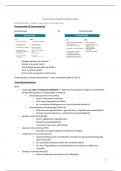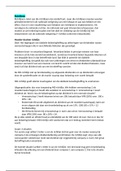Complete: Lectures + Book
Summary
Economics of the
Public Sector
Period 4, 2021
Book: Public Finance by Harvey S. Rosen and Ted Gayer
,Table of Contents
Week 1: Chapter One and Three ............................................................................................................. 2
Chapter 1: Introduction ....................................................................................................................... 2
Chapter 3: Tools of Normative Analysis .............................................................................................. 4
Week 2: Chapter Four and Twelve .......................................................................................................... 9
Chapter 4: Public Goods ...................................................................................................................... 9
Chapter 12: Income Redistribution: conceptual issues ..................................................................... 11
Week 3: Chapter Five ............................................................................................................................ 14
Chapter 5: Externalities ..................................................................................................................... 14
Week 4: Chapter Fourteen and Chapter Fifteen ................................................................................... 19
Chapter 14: Taxation and Income Distribution ................................................................................. 19
Chapter 15: Taxation and Efficiency .................................................................................................. 24
Week 5: Chapter Sixteen and Eighteen ................................................................................................. 29
Chapter 18: Personal Taxation and Behaviour .................................................................................. 35
Week 6: Chapter Nineteen .................................................................................................................... 42
Chapter 19: The Corporation Tax ...................................................................................................... 42
Week 7: Chapter Twenty ....................................................................................................................... 50
Chapter 20: Deficit Finance ............................................................................................................... 50
1
,Week 1: Chapter One and Three
Chapter 1: Introduction
What is the public sector?:
Public Finance/Economics of the Public Sector book: “The field of economics that analyzes
government taxation and government spending policies”.
Abstract definition (Weber): “an institution that successfully claims the monopoly of legitimate
physical force within a certain geographical area”.
➔ government can impose a policy and enforce it (public law)
➔ political decision making
➔ budget mechanism instead of price mechanism
Different from a private company:
- no profit maximization
- no competition
- no market price
Government failure is possible!
In east Europe there is lower government spending. This is because they are late members of EU. In a
communist world they didn’t have public sectors.
Why do we need a public sector? Two theories:
Positive theory: explain how and why things actually happen, analyze consequences → government
developed because certain groups in society (ab)used their power
Normative theory: what are the best instruments to achieve certain (given) objectives? →
government is needed to raise social welfare by increasing efficiency and equity.
Controversial issue:
- Different ideologies:
o Organic view: many people see the society as a body, each individual is a part of this
body. It is a organic whole. Government can be seen as the brain.
o Mechanistic view: government works like a machine, and people also work as a
machine. The individual rather than the group is at center stage. Virtually everyone
agrees that it is good for individuals when government protects them from violence.
To do so government must have a monopoly on coercive power.
- Different weights attached:
o Efficiency: no waste of resource, maximum of goods is produced as what is needed
o Equity: people have equal shares and participate in the economy.
- Intertemporal issues: government has to take care of the future generations. They (future
generation) cannot think about this now, so the government has to take care of this.
2
, Some concepts:
- Unified budget: The document that includes all the federal government’s revenues and
expenditures.
- Regulatory budget: An annual statement of the costs imposed on the economy by
government regulations. (Currently, there is no such budget.)
- Entitlement programs: Programs whose expenditures are determined by the number of
people who qualify, rather than present budget allocations.
Normative arguments for a government:
- Efficiency arguments:
o Government is required for well-functioning of the market mechanism
▪ The market mechanism has to be able to function
• Project property rights and compel fulfilment of contracts
• But a government still need property rights to protect the people
and to function as a government.
• Libertarians: monarchism, also known as nachtwakersstaat in the
Netherlands.
o Government should correct market failures
▪ Too little competition (market power)
▪ Public goods (for example; lighthouse):
• Non excludable: that it is either very expensive or impossible to
prevent anyone from consuming it.
• Non rival: the fact that one person consumes it does not prevent
anyone else from doing so as well.
▪ Externalities (e.g. pollution): A cost or benefit that occurs when the activity
of one entity directly affects the welfare of another in a way that is outside
the market mechanism.
▪ Natural Monopolies: high fixed costs, things like train rails.
▪ Incomplete markets (e.g due to asymmetric information).
• Asymmetric information: A situation in which one party engaged in
an economic transaction has better information about the good or
service traded than the other party.
- Equity argument:
o Government should redistribute income: can be inefficient
- Paternalistic motive:
o Merit/demerit goods
▪ Merit = good just as education, health care etc.
▪ Demerit = not good, these should be prevented by the government, because
it is bad for the society (alcohol, drugs, cigarettes).
3
Summary
Economics of the
Public Sector
Period 4, 2021
Book: Public Finance by Harvey S. Rosen and Ted Gayer
,Table of Contents
Week 1: Chapter One and Three ............................................................................................................. 2
Chapter 1: Introduction ....................................................................................................................... 2
Chapter 3: Tools of Normative Analysis .............................................................................................. 4
Week 2: Chapter Four and Twelve .......................................................................................................... 9
Chapter 4: Public Goods ...................................................................................................................... 9
Chapter 12: Income Redistribution: conceptual issues ..................................................................... 11
Week 3: Chapter Five ............................................................................................................................ 14
Chapter 5: Externalities ..................................................................................................................... 14
Week 4: Chapter Fourteen and Chapter Fifteen ................................................................................... 19
Chapter 14: Taxation and Income Distribution ................................................................................. 19
Chapter 15: Taxation and Efficiency .................................................................................................. 24
Week 5: Chapter Sixteen and Eighteen ................................................................................................. 29
Chapter 18: Personal Taxation and Behaviour .................................................................................. 35
Week 6: Chapter Nineteen .................................................................................................................... 42
Chapter 19: The Corporation Tax ...................................................................................................... 42
Week 7: Chapter Twenty ....................................................................................................................... 50
Chapter 20: Deficit Finance ............................................................................................................... 50
1
,Week 1: Chapter One and Three
Chapter 1: Introduction
What is the public sector?:
Public Finance/Economics of the Public Sector book: “The field of economics that analyzes
government taxation and government spending policies”.
Abstract definition (Weber): “an institution that successfully claims the monopoly of legitimate
physical force within a certain geographical area”.
➔ government can impose a policy and enforce it (public law)
➔ political decision making
➔ budget mechanism instead of price mechanism
Different from a private company:
- no profit maximization
- no competition
- no market price
Government failure is possible!
In east Europe there is lower government spending. This is because they are late members of EU. In a
communist world they didn’t have public sectors.
Why do we need a public sector? Two theories:
Positive theory: explain how and why things actually happen, analyze consequences → government
developed because certain groups in society (ab)used their power
Normative theory: what are the best instruments to achieve certain (given) objectives? →
government is needed to raise social welfare by increasing efficiency and equity.
Controversial issue:
- Different ideologies:
o Organic view: many people see the society as a body, each individual is a part of this
body. It is a organic whole. Government can be seen as the brain.
o Mechanistic view: government works like a machine, and people also work as a
machine. The individual rather than the group is at center stage. Virtually everyone
agrees that it is good for individuals when government protects them from violence.
To do so government must have a monopoly on coercive power.
- Different weights attached:
o Efficiency: no waste of resource, maximum of goods is produced as what is needed
o Equity: people have equal shares and participate in the economy.
- Intertemporal issues: government has to take care of the future generations. They (future
generation) cannot think about this now, so the government has to take care of this.
2
, Some concepts:
- Unified budget: The document that includes all the federal government’s revenues and
expenditures.
- Regulatory budget: An annual statement of the costs imposed on the economy by
government regulations. (Currently, there is no such budget.)
- Entitlement programs: Programs whose expenditures are determined by the number of
people who qualify, rather than present budget allocations.
Normative arguments for a government:
- Efficiency arguments:
o Government is required for well-functioning of the market mechanism
▪ The market mechanism has to be able to function
• Project property rights and compel fulfilment of contracts
• But a government still need property rights to protect the people
and to function as a government.
• Libertarians: monarchism, also known as nachtwakersstaat in the
Netherlands.
o Government should correct market failures
▪ Too little competition (market power)
▪ Public goods (for example; lighthouse):
• Non excludable: that it is either very expensive or impossible to
prevent anyone from consuming it.
• Non rival: the fact that one person consumes it does not prevent
anyone else from doing so as well.
▪ Externalities (e.g. pollution): A cost or benefit that occurs when the activity
of one entity directly affects the welfare of another in a way that is outside
the market mechanism.
▪ Natural Monopolies: high fixed costs, things like train rails.
▪ Incomplete markets (e.g due to asymmetric information).
• Asymmetric information: A situation in which one party engaged in
an economic transaction has better information about the good or
service traded than the other party.
- Equity argument:
o Government should redistribute income: can be inefficient
- Paternalistic motive:
o Merit/demerit goods
▪ Merit = good just as education, health care etc.
▪ Demerit = not good, these should be prevented by the government, because
it is bad for the society (alcohol, drugs, cigarettes).
3










